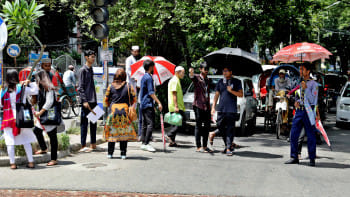Why student volunteering should be a part of school curriculum

In recent weeks, the streets of Dhaka have witnessed a remarkable sight: students, in the absence of police personnel, have taken it upon themselves to manage traffic, safeguard religious institutions, patrol residential areas, organise clean-up projects, and repaint city walls. These actions, born out of necessity and civic responsibility, underscore a profound truth: the youth of Bangladesh are leading the way in shaping a new, more engaged, and responsible society.
The involvement of students in these community service activities is not just a temporary intervention; it represents a potential turning point in how we understand and value youth participation in civic life. In many countries, community service is a compulsory component of high school education, and it is time for Bangladesh to consider a similar approach. Formalising these efforts as extracurricular activities (ECA) could offer students a structured way to contribute to society while gaining valuable skills and credentials.
For example, in Singapore, the Ministry of Education mandates the Community Involvement Programme, which requires students to engage in community service activities throughout their schooling years. Students participate in a variety of initiatives, such as helping the elderly, supporting underprivileged communities, and environmental conservation projects. In South Korea, high school students are encouraged to participate in volunteer work through the "Service Learning" programme, which integrates community service with academic learning. This approach ensures that students not only contribute to society but also reflect on their experiences and apply the skills they learn in the classroom to real-world situations. Japan also promotes community service through its educational system. Many schools have integrated volunteer activities into their curricula, encouraging students to participate in local community projects, such as organising festivals, supporting disaster relief efforts, or assisting in elderly care homes. These activities are tied to students' academic assessments, reinforcing the importance of civic engagement as an essential part of personal and academic growth.
Implementing a similar mechanism in Bangladesh could yield numerous benefits. Students would gain additional ECA opportunities, enhancing their academic portfolios and job prospects while contributing meaningfully to society. Formalising these efforts would ensure that their contributions are recognised and valued. However, to ensure the success of such a program, it must be well-structured and closely monitored. Students should receive formal training for the tasks they undertake, whether it's traffic management, neighbourhood patrols, or environmental clean-ups. This training could be coordinated by government agencies, NGOs, or educational institutions, ensuring that students are well-prepared and informed. Once trained, students could continue participating part-time in these activities, or do a government service-based internship. This way, they would earn community service hour points, tracked and recorded by their schools and a central body, contributing to their ECA portfolios. This structured approach would provide students with a meaningful way to spend their time and create a sense of responsibility.
In our country, access to ECA and networks that provide valuable experience is not distributed equally. Students in urban areas have greater access to internships, volunteer opportunities, and extracurricular programmes that enhance their college applications, mostly to foreign universities, and job prospects. Meanwhile, students in rural areas or from less privileged backgrounds might struggle to find similar opportunities, despite being equally or even more motivated. This is where formalising community service can make a real difference. By establishing a system where all students can earn ECA points through structured volunteer work, overseen by government agencies, we level the playing field. Whether a student is organising a traffic management initiative in Dhaka or leading a tree-planting drive in a remote village, their efforts would be centrally recognised and rewarded.
Perhaps the most significant impact of formalising student community service is the cultural shift it could inspire. By embedding community service into the education system, we are not just providing students with another box to tick—we are fostering a culture of civic responsibility that will shape the future of Bangladesh. As more students engage in structured community service, the ripple effects will be felt throughout society. These young volunteers will carry the lessons they learn into adulthood, becoming leaders who prioritise social good. In the long run, this could lead to a more active, responsible, and compassionate citizenry.
It is a win-win situation: students gain valuable experience and credentials that can open doors to higher education and employment, while society benefits from their contributions. As more students take to the streets, we are seeing a clear signal: the youth of Bangladesh are ready and willing to serve. Now, it is time to give them the framework they need to turn this service into something that benefits them as much as it benefits the community. By providing them with the tools and opportunities to make a difference, we can empower the next generation to build a better, safer, and more inclusive Bangladesh.
Maisha Islam Monamee is student of Institute of Business Administration at the University of Dhaka and a contributor at The Daily Star.
Views expressed in this article are the author's own.
Follow The Daily Star Opinion on Facebook for the latest opinions, commentaries and analyses by experts and professionals. To contribute your article or letter to The Daily Star Opinion, see our guidelines for submission.


 For all latest news, follow The Daily Star's Google News channel.
For all latest news, follow The Daily Star's Google News channel. 







Comments